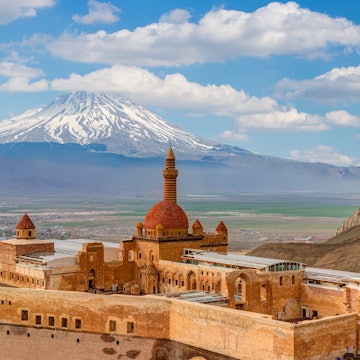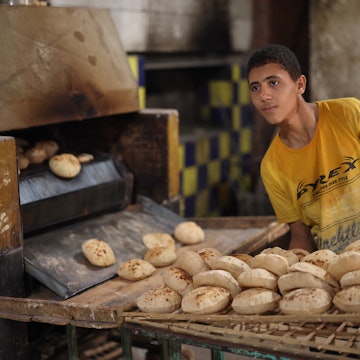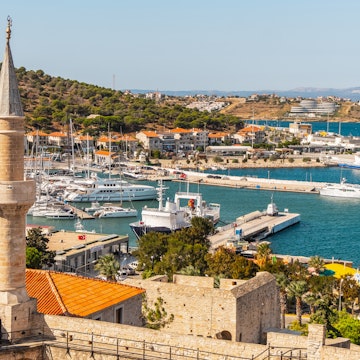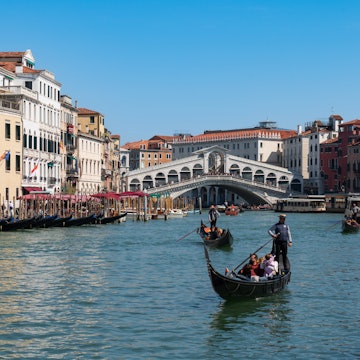
The best time to visit Türkiye, which appeals in all seasons

Feb 18, 2025 • 6 min read

Hot-air ballooning in Cappadocia in winter. Khunhua144/Shutterstock
Most famous for its Mediterranean beaches, ancient ruins and the extensive attractions of its megacity Istanbul, Türkiye also boasts mountains, rural villages, and even deserts and floodplain forests among its geographically diverse offerings.
The country’s wide range of landscapes means that there’s somewhere appealing to travel at any time of year – and that visitors can enjoy great regional variation in traditional Turkish cuisine in every season. Small towns and villages often host colorful festivals around the harvest period of their local crop, whether that’s olives, grapes, artichokes or apricots.
When planning your travel, keep in mind the two most important Muslim holidays, Ramazan Bayramı (Eid al-Fitr) and Kurban Bayramı (Eid al-Adha), whose dates shift slightly every year with the lunar calendar. These holidays are extremely popular times for Turks to travel – akin to traveling around Thanksgiving or Christmas in the USA – so expect more crowds, higher prices, and days on which museums, official offices and small businesses may be closed.
Whether you’re a sunbather, a skier or an avid sightseer, here’s what to do and where to go in Türkiye at every time of year.

March to May is the best time for sightseeing and hiking
Spring is a pleasant time of year to be almost anywhere in the country, with temperatures later in the season often warm enough for outdoor dining and drinking but not oppressively hot. Days on the Mediterranean start getting sunny and warm – though sea temperatures will take some time to catch up.
In March, Kurdish communities in Türkiye celebrate Newroz, a festival marking the beginning of spring, as wintry Istanbul starts to defrost and İzmir hosts its annual European Jazz Festival. The Tulip Festival brings vivid color to parks across Istanbul in April, while wildflowers bloom in more rugged parts of the country, making this a wonderful (if occasionally rainy) time of year for hiking on southern routes like the Lycian Way and Carian Trail.
Çanakkale draws visitors en masse for Anzac Day, the annual commemoration of Allied soldiers (mostly from Australia and New Zealand) killed on the WWI battlefields of Gallipoli. Istanbul hosts its biggest international film festival, while gourmets throng the Alaçatı Herb Festival and Urla Artichoke Festival in the İzmir region.
By May, Istanbul’s sidewalk cafes and rooftop bars are hopping, and the Aegean and Mediterranean coasts are reliably warm but not yet sweltering. Even Türkiye’s far east is thawing out, with the Mardin Biennial greeting visitors to that picturesque city in even-numbered years. It’s a good time to be pretty much anywhere in the country.

June to August is the best time for enjoying outdoor festivals, getting out on the water and escaping to the mountains
Sunseekers both foreign and domestic flock to Türkiye’s Aegean and Mediterranean coasts in summer, meaning crowds and costs rise with the temperatures. Booking ahead is a must in popular destinations – many of which also host lively outdoor festivals featuring performances by the seaside or in historic amphitheaters, such as the Ephesus Opera and Ballet Festival in July and the Gümüşlük Classical Music Festival and Bodrum Ballet Festival in August.
Istanbul has its own summer-festival season, with events devoted to classical music, opera and jazz, and though its outdoor bars and restaurants are lively, the city heat can be oppressive. Travelers to Cappadocia and the formidably hot southeast may want to factor in a siesta-style rest during peak midday temperatures.
Lush lavender fields bloom in Isparta’s Kuyucak village and Seferihisar near İzmir, while Tekirdağ celebrates its local harvest with a cherry festival. The western city of Edirne hosts the Kırkpınar Oil Wrestling Championships, a unique sporting event that has taken place annually since 1360.
With beaches heaving with people during the high summer holidays, a cruise on a gulet (traditional wooden yacht) along the Aegean or Mediterranean coasts makes for an ideal escape. In Istanbul, catch a breeze on a commuter ferry or Bosphorus tour – or, if you’ve got the fitness for it, enroll in the Bosphorus Cross-Continental Swimming Race.
This is also prime time to trek in the Kaçkar Mountains, which are snowed in for much of the rest of the year, and to explore the cool green highland pastures (yayla) throughout the Black Sea region.

September and October are the best months for arts and culture
Beach towns and other top destinations like Cappadocia start to get a bit quieter (though remain wonderfully warm) as the school holidays end and many tourists return home, making this an excellent time for relaxed sightseeing. Especially along the Mediterranean coast, it’s still warm enough to swim. The Bozcaada Jazz Festival draws a hip urban crowd to this north Aegean island, while the Antalya area hosts the Aspendos Opera and Ballet Festival in September and the Antalya Golden Orange Film Festival (one of the country’s most prestigious) in October.
Istanbul and other big cities are bustling again, with lively calendars of arts and cultural events. Contemporary-art lovers won’t want to miss the Istanbul Biennial (odd years) and the smaller but well-regarded Çanakkale Biennial and Sinop Biennial (both in even years). Türkiye’s largest city also hosts the Bosphorus Cup Istanbul Regatta in September.
By October, Istanbul still usually has more nice days than gray ones, the southeast is starting to cool off, and crowds and prices are diminished most everywhere. The month ends with the important national holiday: Republic Day on October 29, which commemorates the proclamation of the Republic of Türkiye in 1923. Expect fireworks and lots of flags.

November to February is the best time for visiting a Turkish bath, hitting the slopes and finding bargains elsewhere
Winter is high season in ski-resort areas like Mt Erciyes in Cappadocia; farther east in Erzurum and Kars; and at Kartepe and Uludağ, both within driving distance of Istanbul.
The fairy chimneys of Cappadocia are even more otherworldly than usual when it snows (though inclement weather often keeps the famous hot-air balloons grounded). And the central Anatolia city of Konya puts on a weeklong festival commemorating the death of Mevlana, the Sufi mystic and poet better known in the West as Rumi.
Elsewhere, you’ll find good deals and few other visitors. The weather can be cold, gray and wet, it’s true. But Türkiye’s many museums provide lots to do indoors (it’s a good time to invest in a museum pass), while its steamy hamams (Turkish bathhouses) are great for warming up. Winter activities in Istanbul include the Istanbul Marathon and 15K race; the Istanbul Theater Festival and Istanbul Puppet Festival, both in November; and early January’s Greek Orthodox Epiphany, when brave members of the community dive into the frigid waters of the Golden Horn to retrieve a wooden cross thrown by a priest.
Brighten up a dreary day with a fresh-pressed juice: for winter is pomegranate season. Another local winter delicacy, Black Sea anchovies (hamsi) are at their fattest and most delicious this time of year. Dinner in a meyhane (tavern) or ocakbaşı (grill house) is a cozy way to pass a lively evening.
In coastal resort areas, you may find some accommodations and restaurants closed for the season, and local transportation more limited – yet the weather can still be relatively mild. The Selçuk Camel Wrestling Championship draws people to the Ephesus area in January. By February, early signs of spring are starting to crack through the winter chill along the southern coast in places like Datça, which hosts an annual almond blossom festival.















